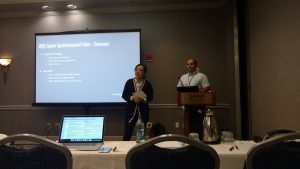 Neuromorphic vision sensors are uncommon and new(-ish) way to perform analog feature detection in an event-based manner. They employ a fundamentally different technique for sensing compared to “typical” cameras. This results in a more complex pixel detector architecture, and correspondingly means their noise differs from ordinary vision sensors. The picture show KRG PhD student Alireza Khodamoradi recently presented our research in this domain in a paper titled “O(N)-Space Spatiotemporal Filter for Reducing Noise in Neuromorphic Vision Sensors”. Here we analyzed this noise and introduced a novel filter with higher accuracy and minimal memory complexity compared to previous works. This paper was accepted to the IEEE International Conference on Computer Design (ICCD) and was invited to IEEE TETC. This is a special honor only extended to the best papers. We plan to have it published after journal reviews by early 2018.
Neuromorphic vision sensors are uncommon and new(-ish) way to perform analog feature detection in an event-based manner. They employ a fundamentally different technique for sensing compared to “typical” cameras. This results in a more complex pixel detector architecture, and correspondingly means their noise differs from ordinary vision sensors. The picture show KRG PhD student Alireza Khodamoradi recently presented our research in this domain in a paper titled “O(N)-Space Spatiotemporal Filter for Reducing Noise in Neuromorphic Vision Sensors”. Here we analyzed this noise and introduced a novel filter with higher accuracy and minimal memory complexity compared to previous works. This paper was accepted to the IEEE International Conference on Computer Design (ICCD) and was invited to IEEE TETC. This is a special honor only extended to the best papers. We plan to have it published after journal reviews by early 2018.